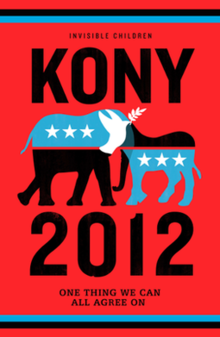| KONY 2012 | |
|---|---|
 Promotional poster for the video, featuring stylized forms of the donkey symbolizing the Democratic Party and the elephant symbolizing the Republican Party, overlapping to form a white dove of peace. | |
| Directed by | Jason Russell[1] |
| Written by | Jason Russell Jedidiah Jenkins Kathryn Lang Danica Russell Ben Keesey Azy Groth[1] |
| Produced by | Kimmy Vandivort Heather Longerbeam Chad Clendinen Noelle Jouglet[1] |
| Cinematography | Jason Russell Bobby Bailey Laren Poole Gavin Kelly Chad Clendinen Kevin Trout Jay Salbert Michael Spear Shannon Lynch[1] |
| Edited by | Kathryn Lang Kevin Trout Jay Salbert Jesse Eslinger Michael Spear[1] |
| Distributed by | Invisible Children, Inc. |
Release date |
|
Running time | 30 minutes |
| Country | United States |
| Language | English |
| Lord's Resistance Army insurgency |
|---|
 |
| Conflict history |
| Related articles |
Kony 2012 is a 2012 American short documentary film produced by Invisible Children, Inc. The film's purpose was to make Ugandan cult leader, war criminal, and ICC fugitive Joseph Kony globally known so as to have him arrested by the end of 2012.[2] The film was released on March 5, 2012,[3][4][5][6] and spread virally, and the campaign was initially supported by various celebrities.[7][8][9]
As of June 2024[update], the film had received over 103 million views and 1.3 million likes on the video-sharing website YouTube,[10] and over 18.7 million views and over 21.8 thousand likes on Vimeo,[11] with other views on a central Kony 2012 website operated by Invisible Children. At the time, the video was the most liked on the whole of YouTube, and is the first video ever to reach 1 million likes. The intense exposure of the video caused the Kony 2012 website to crash shortly after it began gaining widespread popularity.[12] A poll suggested that more than half of young adult Americans heard about Kony 2012 in the days following the video's release.[13][14][15] It was included among the top international events of 2012 by PBS[16] and called the most viral video ever by TIME in 2013.[17]
The campaign resulted in a resolution by the United States Senate and contributed to the African Union's decision to send troops to catch Kony. The film also called for an April 20 worldwide canvassing campaign, called "Cover the Night". On April 5, 2012, Invisible Children released a follow-up video, titled Kony 2012: Part II – Beyond Famous, which failed to repeat the success of the original.
- ^ a b c d e Cite error: The named reference
YouTubewas invoked but never defined (see the help page). - ^ Myers, Julia (March 7, 2012). "A call for justice". Kentucky Kernel. Archived from the original on July 13, 2012.
- ^ "News Hour – Trending Now: Kony 2012". Global TV. March 6, 2012. Archived from the original on March 9, 2012. Retrieved March 7, 2012.
- ^ Lees, Philippa; Zavan, Martin (March 7, 2012). "Kony 2012 sheds light on Uganda conflict". Ninemsn. Archived from the original on March 8, 2012. Retrieved March 7, 2012.
- ^ "Jackson Center To Show KONY2012". The Post-Journal. February 14, 2012. Archived from the original on May 16, 2013. Retrieved March 7, 2012.
- ^ "Uganda rebel Joseph Kony target of viral campaign video". BBC News. March 8, 2012. Archived from the original on September 16, 2018. Retrieved June 20, 2018.
- ^ Neylon, Stephanie (March 7, 2012). "Kony fever hits York!". The Yorker. Archived from the original on March 8, 2012. Retrieved March 7, 2012.
- ^ Molloy, Mark (March 7, 2012). "Kony 2012: Campaign Shedding light on Uganda Conflict a Huge Online Success". Metro. Archived from the original on March 9, 2012. Retrieved March 7, 2012.
- ^ Nelson, Sara C. (March 7, 2012). "Kony 2012: Invisible Children Documentary Sheds Light On Uganda Conflict". Huffington Post. Archived from the original on November 18, 2014. Retrieved March 7, 2012.
- ^ "KONY 2012". YouTube. March 5, 2012. Archived from the original on April 7, 2019. Retrieved January 19, 2019.
- ^ "Kony 2012". Vimeo. February 20, 2012. Archived from the original on May 5, 2012. Retrieved May 5, 2012.
- ^ Lees, Philippa (March 7, 2012). "Australian support amasses for Kony 2012". ninemsn. Archived from the original on March 9, 2012. Retrieved March 7, 2012.
- ^ "Rainie, Lee, Paul Hitlin, Mark Jurkowitz, Michael Dimock, Shawn Neidorf. The viral Kony 2012 video. Pew Internet & American Life Report. March 15, 2012". Pewinternet.org. March 15, 2012. Archived from the original on July 3, 2013. Retrieved April 24, 2019.
- ^ Cite error: The named reference
numberswas invoked but never defined (see the help page). - ^ Polly Curtis; Tom McCarthy (April 20, 2012). "Kony 2012: what happens next?". The Guardian. Archived from the original on October 16, 2013. Retrieved April 22, 2012.
- ^ "Memorable World Moments of 2012 | PBS NewsHour | Dec. 24, 2012". PBS. December 24, 2012. Archived from the original on September 14, 2013. Retrieved October 16, 2013.
- ^ Carbone, Nick (December 4, 2012). "Kony 2012 | Arts & Entertainment | TIME.com". Entertainment.time.com. Archived from the original on October 10, 2013. Retrieved October 16, 2013.